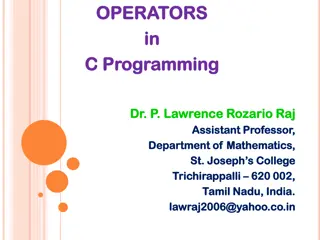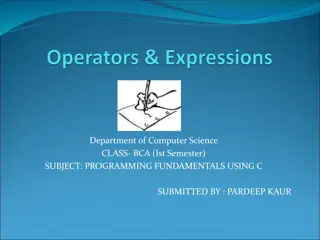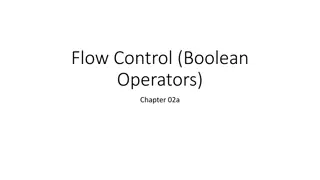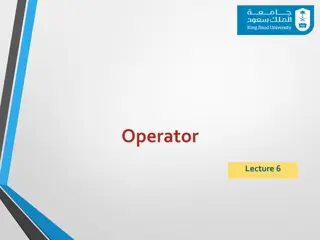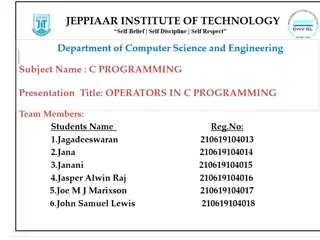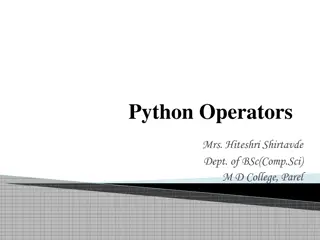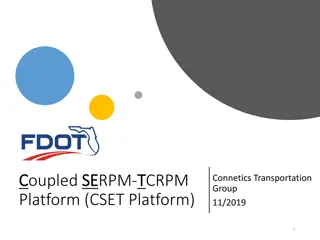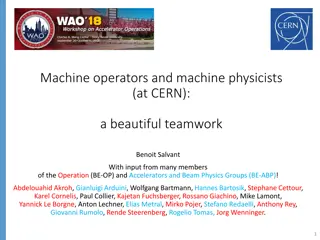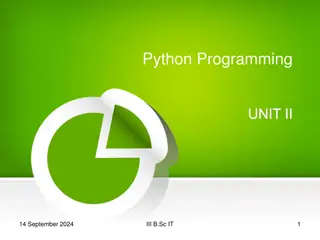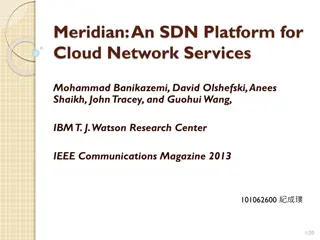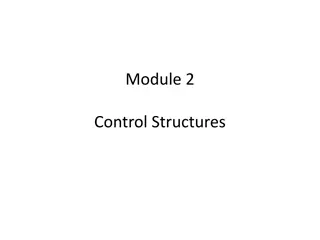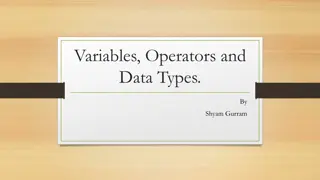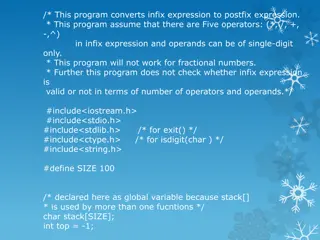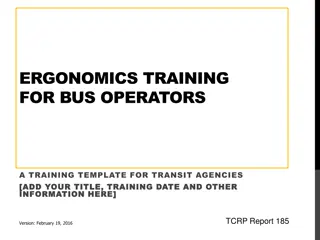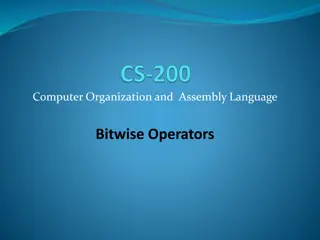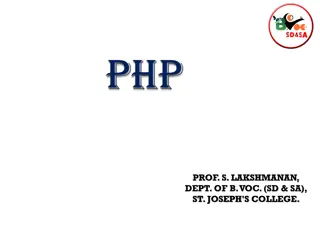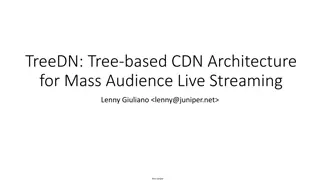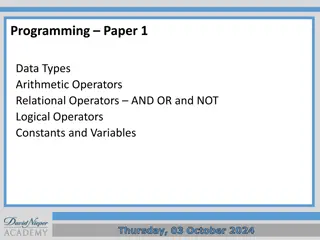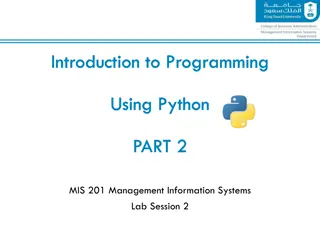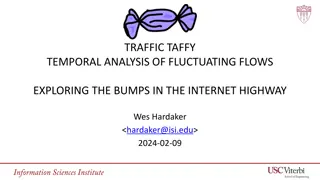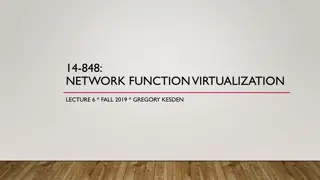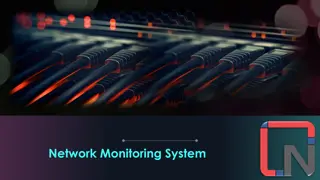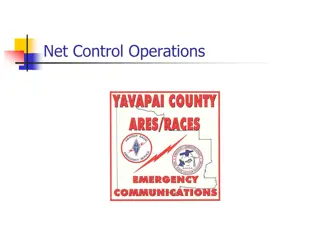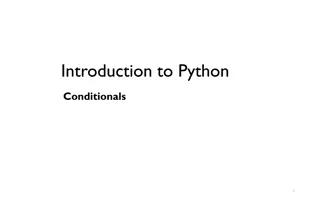Modeling and Generation of Realistic Network Activity Using Non-Negative Matrix Factorization
The GHOST project focuses on the challenges of modeling, analyzing, and generating patterns of network activity. By utilizing Non-Negative Matrix Factorization (NMF), realistic network activity patterns can be created and injected into live wireless networks. Understanding and predicting user behavi
4 views • 28 slides
Road Transport Safety Standardization: The Role of the Corps Transport Standardization Officer
The presentation highlights the Road Transport Safety Standardization policy and the role of the Corps Transport Standardization Officer in regulating fleet operators, ensuring safe transportation operations, and promoting a culture of safety consciousness. It covers the functions of the officer, im
1 views • 13 slides
Understanding Arithmetic Operators in C Programming
C programming language provides various arithmetic operators such as addition, subtraction, multiplication, division, and modulo division. Integer division truncates any fractional part, while modulo division produces the remainder of an integer division. When operands in an arithmetic expression ar
1 views • 18 slides
Introduction to Programming Fundamentals in C
Understanding operators in C programming is essential for performing mathematical and logical operations. This content covers various types of operators such as arithmetic, relational, logical, assignment, increment, decrement, conditional, bitwise, and special operators in C. It explains their func
0 views • 23 slides
Network Compression Techniques: Overview and Practical Issues
Various network compression techniques such as network pruning, knowledge distillation, and parameter quantization are discussed in this content. The importance of pruning redundant weights and neurons in over-parameterized networks is highlighted. Practical issues like weight pruning and neuron pru
0 views • 37 slides
Understanding Boolean Operators and Control Flow in Programming
Explore the world of Boolean operators and control flow in programming with this detailed chapter. Learn about comparison operators, boolean values, and the logical operators and, or, and not. Understand how these concepts are used to control the flow of your code through practical examples. Dive in
1 views • 10 slides
Understanding Operators in C++ Programming
Explore the different types of operators in C++ such as arithmetic, relational, and logical operators. Learn how these operators work and their specific use cases in programming. Gain insight into examples and descriptions of each operator type, enhancing your understanding of C++ programming concep
3 views • 8 slides
Understanding Arithmetic, Increment, and Decrement Operators in C Programming
Explore different types of operators in C programming like arithmetic operators for mathematical operations, increment and decrement operators for changing operand values, assignment operators for assigning values to variables, and relational operators for checking relationships between operands. Se
1 views • 14 slides
Network Slicing with OAI 5G CN Workshop Overview
Overview of Network Slicing with OAI 5G CN workshop focusing on the crucial role of network slicing in realizing the service-oriented 5G vision. This workshop covers topics like multiple logical networks creation on shared infrastructure, different types of network slices, preparation and instantiat
1 views • 6 slides
Understanding Snort: An Open-Source Network Intrusion Detection System
Snort is an open-source Network Intrusion Detection System (NIDS) developed by Cisco, capable of analyzing network packets to identify suspicious activities. It can function as a packet sniffer, packet logger, or a full-fledged intrusion prevention system. By monitoring and matching network activity
0 views • 23 slides
Understanding Python Operators: Arithmetic, Comparison, and Assignment
Python language supports various types of operators such as arithmetic operators for addition, subtraction, multiplication, division, modulus, exponent, and floor division. It also includes comparison operators to check equality, inequality, greater than, less than, greater than or equal to, and les
1 views • 11 slides
Introduction to Coding Ethics and Control Structures
Explore the fundamental concepts of coding ethics, including respect for privacy and confidentiality. Dive into control structures in programming, such as conditionals, logical operators, and relational operators. Gain insights into different types of control structures like sequential, selection/co
0 views • 44 slides
Challenges and Implications of Labor Shortages in the Restaurant Industry
Labor shortages in the restaurant industry, exacerbated by the COVID-19 pandemic, have led to operators facing challenges such as reduced hours of operation. To attract employees, operators are offering increased wages and benefits. The future implications include potential increases in menu prices
0 views • 8 slides
Survey Results on Motorcoach Operators' Knowledge of ELD Mandate
SYTA, in collaboration with BISC, conducted a survey among tour operators to gather feedback on the implementation of Electronic Logging Devices (ELD). The results showed a high familiarity with the ELD mandate among companies and a strong knowledge of service limits for motorcoach operators in the
0 views • 34 slides
Transportation Network Modeling and Analysis with C.Coupled SE Platform
This content outlines the features and functionalities of the C.Coupled SE Platform (CSET Platform) developed by the Connetics Transportation Group. It covers aspects such as interface design, inputs merging, purposes, platform development using Cube, TAZs merging, and network attributes. The platfo
0 views • 11 slides
The Teamwork and Collaboration at CERN: Machine Operators and Physicists
The collaboration between machine operators and machine physicists at CERN exemplifies a beautiful team effort. The roles, duties, perceptions, and success stories of this partnership are explored through insightful images and discussions. The agenda delves into who machine operators and beam physic
0 views • 54 slides
Python Programming Expressions and Arithmetic Operators Overview
Learn about expressions, arithmetic operators, value combinations with operators, operator precedence and associativity in Python programming. Understand arithmetic operations, variable assignments, common errors, and examples highlighting key concepts such as unary and binary operators. Enhance you
0 views • 15 slides
Understanding Operator and Management Agent Requirements in Healthcare Projects
This chapter delves into the various requirements for operators and management agents in healthcare projects. It discusses the critical role these entities play in ensuring the success of mortgage projects by focusing on prudent operations, timely payments, and resident care. The content covers the
0 views • 44 slides
Meridian: An SDN Platform for Cloud Network Services
Meridian is an SDN platform developed by Mohammad Banikazemi, David Olshefski, Anees Shaikh, John Tracey, and GuohuiWang at IBM T. J. Watson Research Center. The platform focuses on providing cloud network services efficiently. It encompasses an architecture that enables faster and more convenient n
0 views • 21 slides
Vendor Annual Report Filing Guidelines for Skill-Based Amusement Machine Operators
Licensed Type-B and Type-C Skill-Based Amusement Machine (SBAM) Operators and Vendors are required to file an annual report with the Commission by March 31st each year. The report should detail activities of the previous calendar year, including information on operators, games sold, and more. Filing
0 views • 21 slides
Understanding Perl Control Structures and Comparison Operators
In Perl, comparison operators are used for standard comparisons, where Perl supports operators like greater than (>), less than (<), greater than or equal to (>=), less than or equal to (<=), equal to (==), and not equal to (!=). Boolean values like true and false are represented by numerical values
0 views • 25 slides
Energy Sector High-Level Planning Overview
Detailed high-level planning activities for the energy sector including consultation, workshops, proposal drafting, and implementation frameworks for European platforms. It also includes aspects like transparency regulation, balancing capacity products, and network coordination. The planning involve
0 views • 8 slides
Understanding Variables, Operators, and Data Types in PHP
Explore the rules for defining variables in PHP, including naming conventions and case sensitivity. Learn about user-defined variables, scalar vs. compound variables, and the process of declaring and assigning values. Dive into PHP operators, such as arithmetic, assignment, comparison, increment/dec
0 views • 22 slides
Program to Convert Infix Expression to Postfix Expression
This program converts an infix expression to a postfix expression. It assumes there are five operators (*, /, +, -, ^) in the infix expression and operands are single digits only. The program does not handle invalid expressions or fractions. The provided code snippet contains functions for stack ope
0 views • 9 slides
Comprehensive Ergonomics Training for Bus Operators
This training template, designed for transit agencies, focuses on promoting ergonomics best practices, health, and safety for bus operators. The template includes content areas such as ergonomics demands of work, bus workstation target areas, programs, policies, and forms, and training notes with ac
0 views • 43 slides
Understanding Bitwise Operators in C and C++
Explore the world of bitwise operators in C and C++, including how they allow operations on bits at byte boundaries, the benefits of bitwise operations for data compression, encryption, and speed, as well as the usage and limitations of shift, complement, and logical operators.
0 views • 32 slides
Understanding Network Analysis: Whole Networks vs. Ego Networks
Explore the differences between Whole Networks and Ego Networks in social network analysis. Whole Networks provide comprehensive information about all nodes and links, enabling the computation of network-level statistics. On the other hand, Ego Networks focus on a sample of nodes, limiting the abili
0 views • 31 slides
Introduction to PHP Scripting Language and Operators
This content provides an overview of PHP, a server-side scripting language used to create dynamic and interactive web pages. It covers the basics of PHP scripting blocks, variable usage, operators, and their examples. Additionally, it explains common PHP operations like addition, subtraction, multip
0 views • 60 slides
Emerging Trends in Live Streaming: Challenges and Opportunities
The rise of live streaming is transforming the digital landscape, impacting network resources and audience engagement. With increasing demand for high-quality live content, network operators face challenges in scalability and capacity. The transition to live streaming reflects shifting consumer beha
0 views • 29 slides
Understanding Logical Operations and Their Applications
Logical operators such as AND, OR, NOT, and XOR play a crucial role in programming and control systems. They are used to combine logical expressions and make decisions based on certain conditions. By utilizing truth tables, these operators help in solving problems efficiently. This article explores
0 views • 24 slides
Understanding Relational and Logical Operators in Scientific Computing
Learn about the importance and use cases of relational and logical operators in scientific computing through examples like gene expression analysis, grading systems, and workplace scheduling. Discover how to effectively implement these operators in programming constructs and functions such as if sta
0 views • 35 slides
Understanding Data Types, Arithmetic Operators, and Logical Operators in Programming
Learn about data types such as integers, real numbers, booleans, characters, and strings. Explore arithmetic operators including division, floor division, and modulus. Understand relational operators for comparisons and logical operators like AND and OR for decision making in programming. Avoid conf
0 views • 15 slides
Python Programming Essentials: Basics, Operators, Expressions, and Control Flow
This segment delves into the fundamentals of Python programming with a focus on essential concepts such as comments, numbers, strings, variables, arithmetic operators, logical operators, order of execution, expressions, and control flow statements like conditional execution and looping. Learn about
0 views • 12 slides
Exploring Traffic Anomalies with Traffic Taffy: Network Operators' Challenges
Discover how network operators tackle odd anomalies in internet traffic with Traffic Taffy, a tool that aids in temporal analysis of fluctuating flows. Current solutions and specific problem spaces are discussed, alongside insights for comparing anomalies against baselines and defining the problem s
0 views • 24 slides
Network Function Virtualization (NFV) Overview
Network Function Virtualization (NFV) focuses on virtualizing network functions to improve efficiency and reduce costs in network infrastructure. The lecture discusses key readings, devices that compose a network, specialization of devices, benefits of one-device-does-anything approach, and the goal
0 views • 21 slides
Enhancing Network Stability with Network Monitoring Systems
Network monitoring is crucial for efficient management and proactive issue detection in a network environment. Factors influencing an effective network system include choosing the best OEM, SLA agreements, and selecting a reliable System Integrator. Reactive monitoring can lead to financial losses a
0 views • 12 slides
Introduction to Net Control Operations: Role and Responsibilities of Operators
This content provides a comprehensive overview of the role of Net Control Operators in incident management systems, including maintaining accountability, log management, shift changes, and operational procedures. It covers key aspects such as NCS and NCO definitions, objectives of the course, and de
0 views • 56 slides
Learning Python Conditionals and Operators
Explore comparison operators, boolean operations, operator precedence, and conditionals in Python. Learn how to use these concepts effectively to make decisions and control the flow of your programs. Understand the differences between assignment and equality operators, and master the usage of logica
0 views • 32 slides
Accelerating Systemic Change Network Inaugural Workshop Summary
The Accelerating Systemic Change Network held its inaugural workshop at Howard Hughes Medical Institute in July 2016 to address the lack of coordination in improving higher education. With a vision to become a professional hub for change researchers in STEM education, the network aims to enhance ind
0 views • 5 slides
University Network Section Overview July 2015 - March 2016
The presentation covers the network team structure, team members, objectives, goals, report outline, network statistics, accomplishments, and future plans of the university network section from July 2015 to March 2016. It highlights efforts to provide stable internet and intranet services, restructu
0 views • 16 slides


